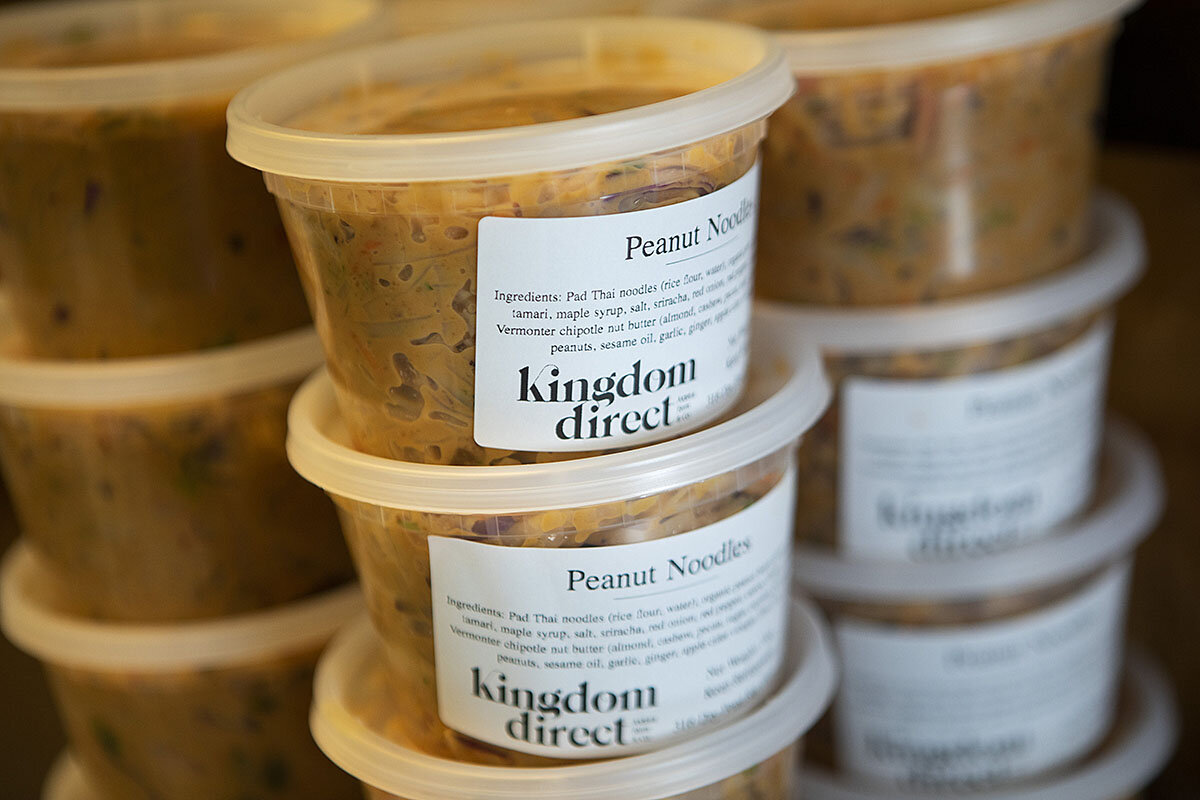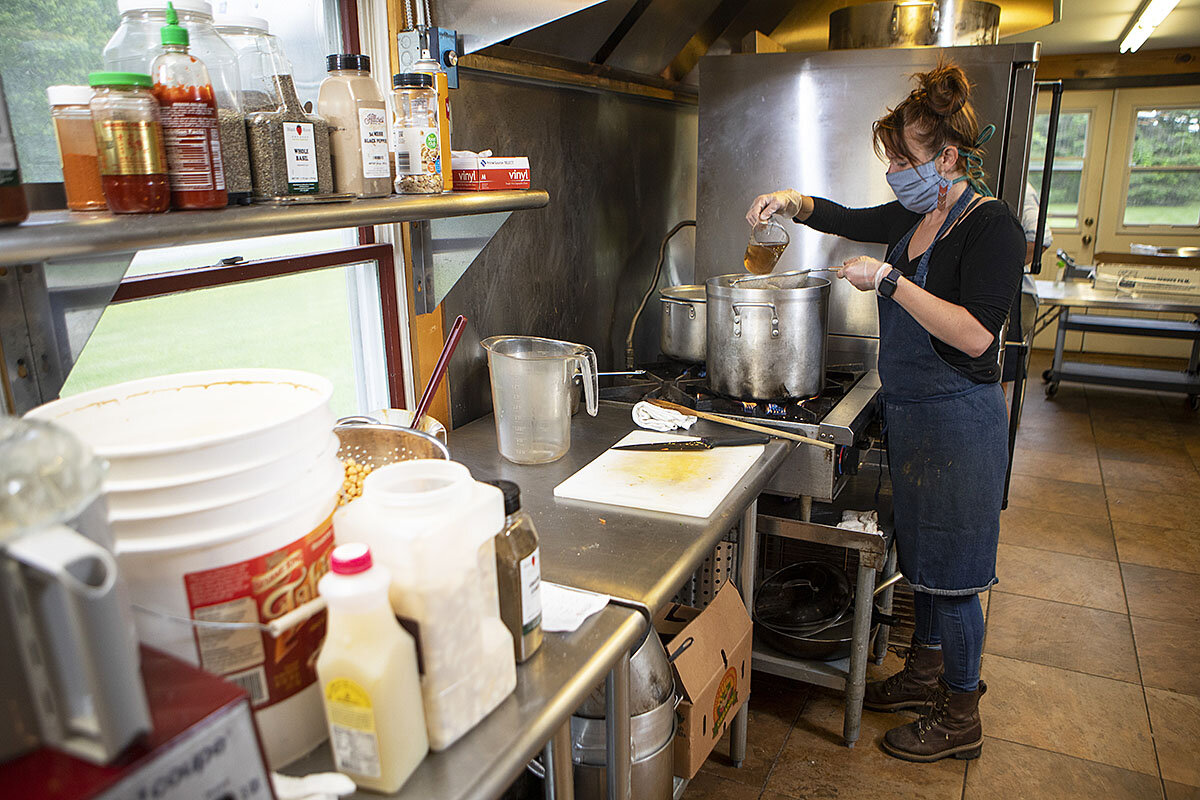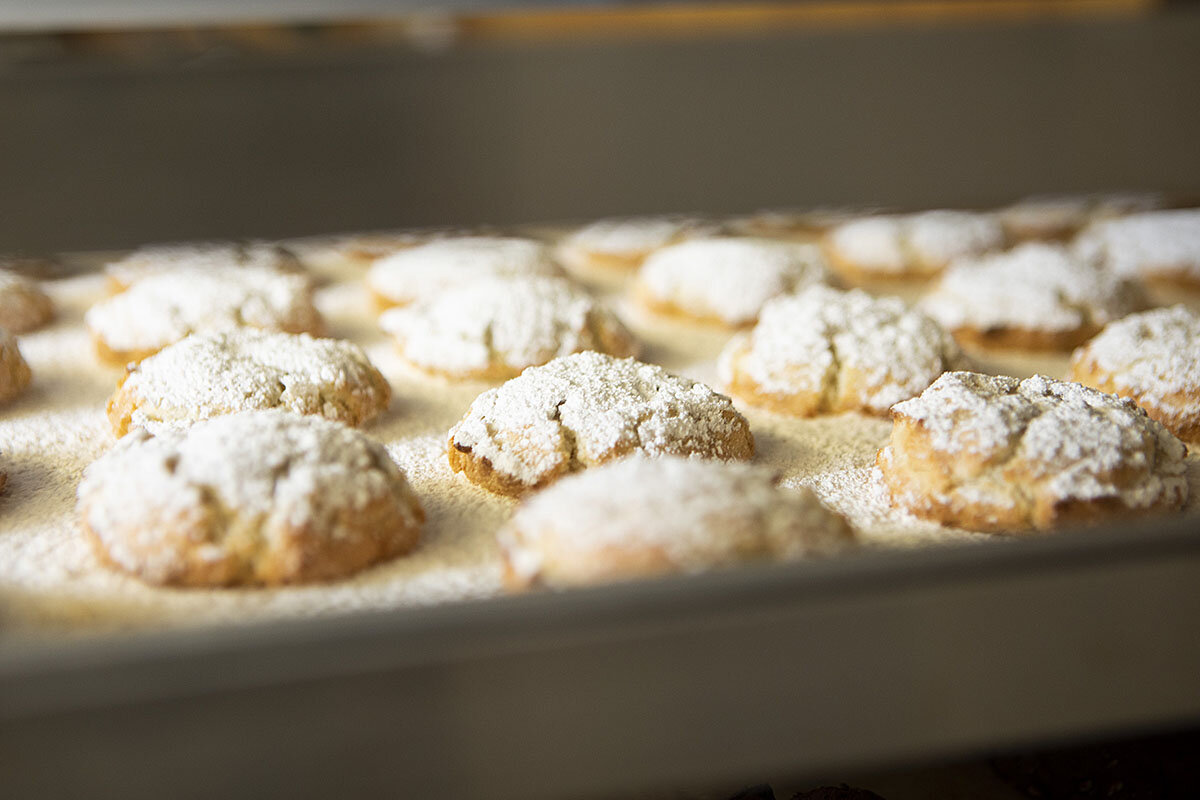How Vermont farm turned being a good neighbor into good business
| Woodstock, Vt.
When the COVID-19 pandemic hit Vermont in mid-March, pastry chef Thomas McCurdy spent a week or two feeling confused and “out of sorts,” as he puts it, jarred by the economic impact on his business and his community. But that didn’t last.
“I woke up one day and said, ‘OK, that’s enough of that. Time to get to work,’” he says. That’s when Mr. McCurdy and his husband, Bailey Hale, who own a bakery and flower farm in Irasburg, Vermont, hatched the idea for Kingdom Direct.
Launched at the beginning of April from their premises at Ardelia Farm & Co., Kingdom Direct offers weekly home delivery of ready-cooked meals and fresh local foods to customers in the Northeast Kingdom region around Irasburg, a picturesque village 25 miles south of the Quebec border.
Why We Wrote This
Thomas McCurdy was worried about the impact of the COVID-19 pandemic on his own small business. But the way he went about saving it helped his neighbors as much as himself.
The online service was partly inspired by the need to do something to keep their business afloat during the COVID-19 crisis. But the founders also hoped to help their neighbors – both the farmers who sell them food and people hit financially by the pandemic in the area, which has one of the highest unemployment rates in Vermont.
“We were not the only ones scrambling to make a living,” Mr. McCurdy says.
Editor’s note: As a public service, all our coronavirus coverage is free. No paywall.
So Mr. McCurdy turned from patisseries to high-class takeout, cooking gourmet and exotic menus from Mexico, China, Iran, and Greece and delivering the food to customers who had ordered online.
Just before a client reaches the payment stage, she is prompted to donate to a local nonprofit – a different organization each week – working with disadvantaged local people.
That goes to the heart of Kingdom Direct, whose name was chosen to reflect the region, not the business behind it.
“It’s not just about us,” Mr. McCurdy says.
“It made them cry”
One beneficiary of the scheme was the Backpack Program at nearby Derby Elementary School in Derby Line, Vermont, a small, rural town where about half the 500 students were signed up for free or reduced price lunches this spring. Under the program, launched last December, school counselor RoseAnna Cyr ensured that children from families having difficulty feeding themselves took home non-perishable food items before long weekends or school breaks.
In March, as the coronavirus struck and her school closed, she expanded her scope, also delivering fresh produce, bread and cheese to families needing help. And those families found an extra treat for the kids in each bag: homemade cookies from Ardelia Farm. That’s an item most of the families couldn’t usually afford, Ms. Cyr says.
“I’ve had parents comment that it made them cry, to have something special like that delivered to their child,” she says.
Kingdom Direct has also given a boost to local farmers, who struggled to find customers for their goods in early spring when the schools that usually buy a lot of milk and fresh vegetables shut down and farmers markets were closed.
One of them is Hannah Marvyl Pearce, who owns Hillside Farm with her father a couple of miles down the road from Mr. McCurdy. She found herself with eggs and applesauce in March and nowhere to sell them.
“It was a really good resource, to provide eggs to him,” Ms. Pearce says of Mr. McCurdy, who offers delivery of locally produced milk, cheese, eggs, mushrooms, and poultry, as well as cooked meals. “We easily sold them all; it was a really nice way to shift our market a little bit” away from traditional channels in new directions, Ms. Pearce adds.
She says people are realizing the value of locally produced food. “There’s a deeper appreciation for farmers and food in general, and a realization that a lot of folks don’t have dependable access to it,” Ms. Pearce says.
One of Mr. McCurdy’s favorite parts of the week is when he writes checks out to the farms.
“That feels really nice, to be able to support all those farmers through what we’re doing here,” he says.
Ms. Cyr, who is also a customer, tries to buy food from a different local farm each week. “This is definitely a time when we need to support our communities and support each other,” she says.
Feeding his neighbors
In April, just over a week after starting Kingdom Direct, Mr. McCurdy’s professional talents as a pastry chef won him the wherewithal to scale up his new service. Competing on the Food Network’s “Chopped Sweets” program, he won the competition for best dessert, and the $10,000 prize that went with it.
“It was a very nice surprise in the mail,” Mr. McCurdy says.
He didn’t get much of a chance to bask in the glow of victory, aside from a Zoom watch with a few friends of the broadcast on which he baked his winning recipe. But the prize money helped pay for a refrigerated delivery van and some much-needed kitchen equipment. He also hired a couple of part-time staff.
Kingdom Direct has helped Ardelia Farm stay afloat too, at a time when its summer outlook was grim. The farm would usually have relied on cut-flower sales to event florists in New York City and on Mr. McCurdy’s wedding cake sales. Those income streams dried up as customers canceled their summer events.
One of Mr. McCurdy’s biggest takeaways from this experience is the increase in his local business. Previously, Ardelia Farm had sold everything it grows and makes out of town.
That has changed dramatically because of COVID-19. “Approximately 40% of Kingdom Direct customers are from our community,” Mr. McCurdy says. “That’s really exciting to me, to be really feeding our neighbors, our community.”
Ardelia Farm, he says, has been able to make an impact, helping farmers, nonprofits, and local families.
“We’re all in this together,” Mr. McCurdy says, “and I feel really grateful to have found this specific little niche ... to be able to piece this all together to support as many people as we can.”
Editor’s note: As a public service, all our coronavirus coverage is free. No paywall.










